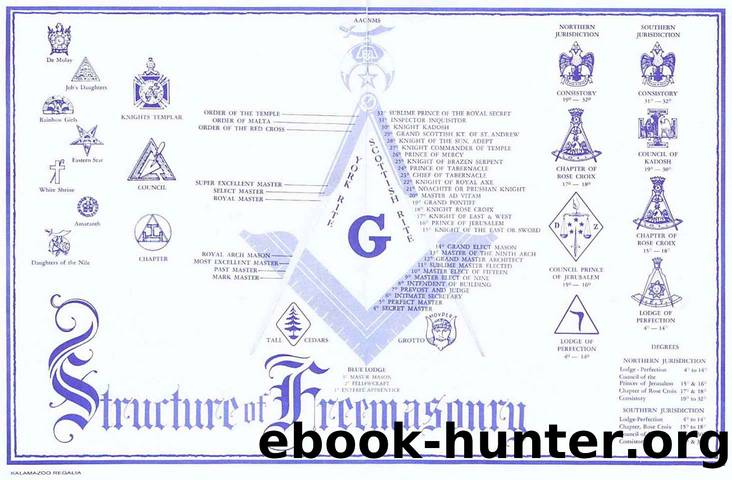Traditions of freemasonry and its coincidences with the ancient mysteries (1870, c1865) by Azariah Pierson

Author:Azariah Pierson [Pierson, Azariah]
Language: eng
Format: azw
Published: 2011-01-10T16:00:00+00:00
Fel ow Crafts carry a sprig of cassia in their hands in token of their innocence ;"
another, " that after making a discovery they stuck a sprig of cassia in the ground to mark the place, and went and informed King Solomon." The York legend says that
"the place was the seaside /â¢' the French say " it was on Mount Lebanon ;" another that" it was near Jerusalem ;" and stil another, that "it was on a smal hil west of Mount Moriah;" and yet another, that " it was on Mount Calvary."
The Hebrew word which in Psalms is rendered " cassia" is derived from "j^p, " to cut short," " to cut off." With this view of the meaning of the term cassia its masonic application is apparent and peculiar, and its symbolic coincidence with that portion of the legend in which it first made its appearance is obvious at once to the initiated.
An old legend says " My name is cassia," which is equivalent to saying, " I have been in the grave ; I have triumphed over it by rising from the dead, and being regenerated in the process I have a claim to life everlasting."
From that part of the legend of the voyage of JBneas in search of his father, it appears that Anchises, the great preserver of the Trojan name, could not have been discovered but by the help of a bough which was plucked with great ease from a tree.
The coincidence with the legend of the masonic sprig is sufficiently evident without quoting further. Again, the principal cause of ^Eneas' descent into the shades was to inquire of his father the secrets of the fates which should some time be fulfil ed among his posterity. The occasion of the brethren searching so diligently for their master was, it seems, to receive from him the secret word of Masonry, which should be delivered down as a test to their fraternity of after ages.
Fol owing this story in Yirgil is a verse relating to a friend of .^Eneas :
" Prseterea jacet exanimum tibi corpus amici, Heu nescis!"
The body of your friend lies near you dead, Alas, you know not how I This person was Misneus, who had signalized himself in the Trojan war alongside of Hector, and after the fal of Troy had accompanied JEneas to Italy on the shores of which country, near the city of Cumse, he was murdered and buried under a high hil .
But there is another story in Virgil which presents a more striking coincidence than either of the others ⢠which is this : " Priamus king of Troy, in the beginning of the Trojan war, committed his son, Polydorus, to the care of Polymnestor king of Thrace, and sent with him. a great sum of money; but after Troy was taken, the Thracian, for the sake of the money, kil ed the young prince and privately buried him. ^Eneas, coming into that country and accidental y plucking up a shrub that was near to him on the side of a hil , discovered the murdered body of Polydorus.
Download
This site does not store any files on its server. We only index and link to content provided by other sites. Please contact the content providers to delete copyright contents if any and email us, we'll remove relevant links or contents immediately.
The Power of Habit by Charles Duhigg(3129)
Man's Search for Meaning by Viktor E. Frankl(2669)
Mckeown, Greg - Essentialism: The Disciplined Pursuit of Less by Mckeown Greg(2440)
MOSES THE EGYPTIAN by Jan Assmann(2412)
Devil, The by Almond Philip C(2325)
The Complete Dead Sea Scrolls in English (7th Edition) (Penguin Classics) by Geza Vermes(2277)
Unbound by Arlene Stein(2268)
I Capture the Castle by Dodie Smith(2034)
Schindler's Ark by Thomas Keneally(1879)
The Invisible Wall by Harry Bernstein(1799)
The Gnostic Gospel of St. Thomas by Tau Malachi(1794)
The Bible Doesn't Say That by Dr. Joel M. Hoffman(1677)
The Secret Doctrine of the Kabbalah by Leonora Leet(1607)
Political Theology by Carl Schmitt(1577)
The Jewish State by Theodor Herzl(1533)
A History of the Jews by Max I. Dimont(1529)
The Dead Sea Scrolls Bible by Martin G. Abegg(1513)
The Book of Separation by Tova Mirvis(1485)
Oy!: The Ultimate Book of Jewish Jokes by David Minkoff(1369)
